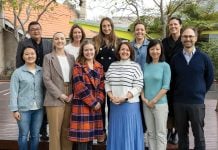The Melbourne Grammar School curriculum is more than simply a plan for instruction in the classroom; it’s a statement of our educational intent, purpose, and values as well as learning outcomes. It’s a program whose ultimate aim is to nurture young humans so that they grow their resilience, thoughtfulness and intellectual curiosity.
In addition to core academic knowledge and understanding, our curriculum also focuses on what some might refer to as ‘soft skills’ – for example, teamwork, creativity, communication – which relate to attitude and disposition. However, we also recognise that, in today’s world, people need to be able to see the world through different perspectives, particularly at work and this is why we try to not only build empathy, but also offer a broad range of subjects and integrate disciplines within them when possible.
While our overarching objectives remain constant, the curriculum itself can’t be static – indeed, the continual evolution of the School’s curriculum has always been central to its success. In great part, that is due to the expertise and creativity of our staff. But the School also looks to best practice and insights from outside its gates.
Concentrating on breadth as well as discipline-specific depth
As part of this continuing exploration of curriculum improvement, Emeritus Professor James (Jim) Angus AO was recently invited to speak with School staff who have leading roles in curriculum development across Years 7 – 10.
As Dean of the Faculty of Medicine, Dentistry and Health Sciences at the University of Melbourne between 2003 and 2013, Jim was instrumental in transforming the way the institution approaches its education offering.
He spoke about how the Melbourne Model, now often referred to as the Melbourne Curriculum, had relevance to the Melbourne Grammar curriculum, particularly from Year 7.
In 2008, the university drastically reduced the number of bachelor degrees it offered – from nearly 100 to fewer than ten. At the same time, it began to dedicate 25 percent of learning within a degree to what the model designers called breadth subjects.
“By undertaking subjects outside your immediate discipline, you open your horizons, learn some of the soft skills, build perspective and begin to understand what else you need [beyond deep technical skills] if you’re really going to graduate as a rounded person,” Jim told the gathering.
“As journalist Horace Freeland Judson once said, ‘You must feel in yourself the exploratory compulsion. Develop the rage to know.’”
Breadth subjects help students to develop that ‘rage’. This fervent curiosity, in combination with what Jim described as a “bundle of skills”, is important for life in general, but absolutely critical when it comes to professional success.
Great Australian success stories show the way
Jim also has decades of experience engaging with industry about its changing needs through his multiple appointments and affiliations (see below). He explained that industry leaders can no longer be specialists; they need to have multiple technical and ‘soft’ skills in a range of different areas if they are to effectively lead the large, complex organisations of the future.
At the meeting Jim spoke about a 2015 report that he contributed to as a member of the Australian Council of learned Academies. It investigated the executive skill sets within the top 50 ASX-listed companies at that time.
“What’s business looking for? Well, let’s look at a technical company like Cochlear, which is highly respected by engineers and physicists. [The report showed] that Cochlear executives were an equal mix of biomedical engineers and social scientists who had consumer and marketing skills. That better enables the company to be able to build products suitable for different countries, cultures, and health systems,” Jim said.
“What about Animal Logic? It’s Australia’s largest and most successful visual effects and animation company. And they understand that innovation in media and entertainment is, almost by definition, underpinned by the interrelationships between technology and creative design.”
Overall, the report made it clear that leadership teams in the most successful companies in Australia [on average] comprised 50 percent of people who had skills in the humanities, arts or social sciences, and 50 percent of people who had skills in science, technology, engineering, or maths. What was crucial was that, despite their different perspectives, there was a common sense of purpose and a real dedication to collaboration between these individuals.
As Jim said in his address, a strong curriculum, whether for a school or a university, must take this skill divergence into account. It must offer students a chance to understand that society is inherently complex, and that only by looking at it through various different lenses, can organisations – and the humans who run them – make truly great contributions.
About Emeritus Professor James (Jim) Angus AO FAA FAHMS (Hon) BSc PhD (U Syd)
Jim Angus is a highly respected academic and accomplished biomedical researcher with an impressive array of appointments and affiliations.
His notable roles have included serving as Dean of the Faculty of Medicine, Dentistry and Health Sciences at the University of Melbourne between 2003 and 2013.
Additionally, he has contributed as a member of the Program Steering Committee of the Australian Council of Learned Academies from 2014 to 2016 and played a pivotal role in establishing the Australian Academy of Health and Medical Sciences as a member of its Steering Committee from 2013 to 2014.
Jim serves as President of the National Stroke Foundation, Chair of the University of Melbourne Sport Board and Chair of the Australian Advisory Council on Medicinal Use of Cannabis. He has been a dedicated Board Director of the Jack Brockhoff Foundation since 2015. Recently he was appointed the Chair of the Cumming Global Centre for Pandemic Therapeutics at the Doherty Institute, The University of Melbourne.
His significant achievements also extend to being a Fellow and former Council Member of the Australian Academy of Science and the International Academy of Cardiovascular Sciences. Jim has received the distinction of being an Honorary Fellow of the Australian Academy of Health and Medical Sciences.
Jim Angus has been fulfilling the role of Lieutenant-Governor of Victoria since November 2021. Notably, he stepped into the position of acting Governor of Victoria from June 2023 to August 2023, bridging the gap between the service of the current and immediate past Governors.
He was a member of Melbourne Grammar School Council from 1990 until 1998. His three children attended the School and six of his grandchildren are also current or past students.



